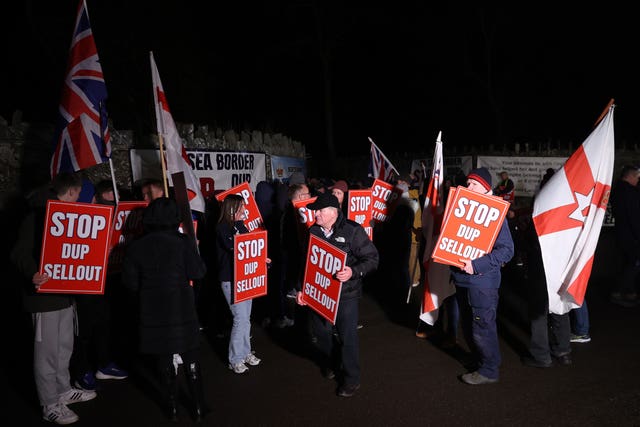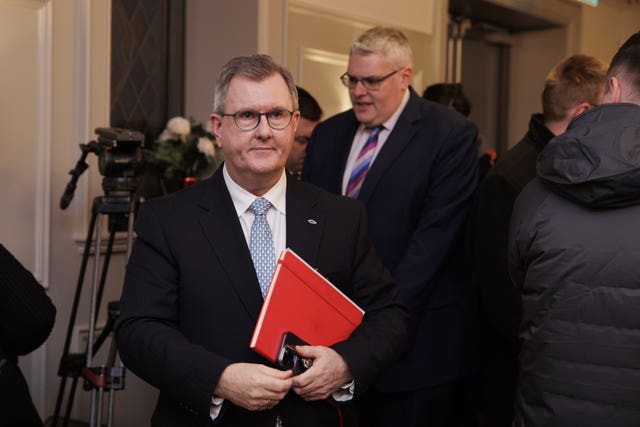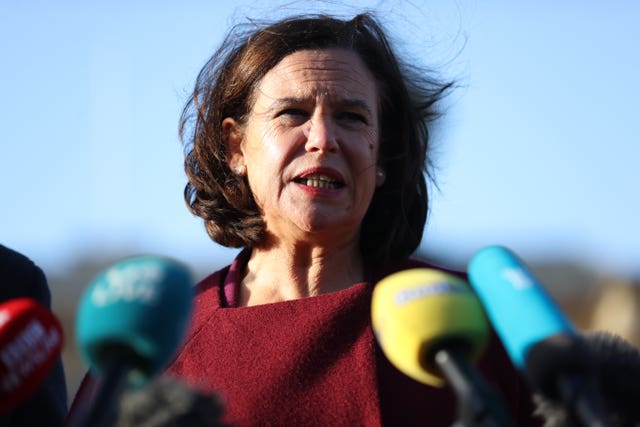Powersharing deal will remove all Brexit checks on GB-NI trade, says Donaldson
The DUP leader said the Stormont institutions could be back up and running within days.

A deal to restore Stormont powersharing will remove all post-Brexit checks on goods moving into Northern Ireland from the rest of the UK, the leader of the DUP has insisted.
Sir Jeffrey Donaldson expressed hope that the Stormont institutions could be back up within days after he secured the backing of his party executive for Government proposals aimed at addressing the DUP’s concerns over Brexit’s so-called Irish Sea border.
Sir Jeffrey conceded that his party had not got everything it wanted in the negotiations with the UK Government, but he said the deal provided the basis for the DUP to drop its two-year blockade on devolution in Belfast.
The lengthy wrangling over the shape of an agreement to resurrect powersharing has primarily been between the DUP and UK, but any move to remove all checks and customs paperwork on GB-NI trade would require EU support, as the arrangements that govern Irish Sea trade – the Northern Ireland Protocol and Windsor Framework – have been jointly agreed between Brussels and London.
Sir Jeffrey has made clear his party’s return to Stormont is dependent on the UK Government implementing the various legislative assurances and other measures it has offered.

Northern Ireland Secretary Chris Heaton-Harris has welcomed the DUP move and made clear the Government would deliver on its end of the deal.
The return of Stormont will also see the Treasury release a £3.3 billion package to support under-pressure public services in Northern Ireland. The financial package includes money to settle the demands of striking public sector workers in the region this year.
The DUP has been using a veto power to block Stormont’s devolved institutions for two years in protest at the post-Brexit arrangements that have created trade barriers between Great Britain and Northern Ireland.
The DUP leader said the if the Government moved with speed Stormont could be back within days.
“For the movement of goods within the United Kingdom, the protocol of course imposed severe restrictions on the movement of those goods – these new arrangements remove those restrictions,” he told BBC Radio Ulster.
“Zero checks, zero customs paperwork on goods moving within the United Kingdom. That takes away the border within the UK between Northern Ireland and Great Britain and that is something that’s very important.
“Now, are these proposals perfect? Have we achieved everything that we wanted to achieve? No, we haven’t, I will be honest with people about what we’ve been able to deliver, the substantive change.”

That came after he had secured what he said was the “decisive” backing of the 130-strong party executive during a five-hour meeting on Monday night.
He said DUP party officers – a key 12-strong decision-making body – had also “mandated” him to move forward on the basis he was proposing.
During the powersharing impasse, the DUP has used “seven tests” to measure any proposals designed to address its concerns on the trading arrangements.
Sir Jeffrey said the package on the table represented “progress” across all seven tests.
Support for the deal is not unanimous within the DUP and several senior figures remain fiercely opposed to the proposed agreement to restore powersharing.
Asked about the potential for dissent within the party, Sir Jeffrey added: “I am confident that all members of the party will accept what was a decisive move by the party executive.”
Around 50 loyalist and unionist protesters assembled outside Monday night’s meeting at the Larchfield estate in Co Down, many carrying posters and banners warning against a DUP “sellout”.
Some shouted at DUP members as they drove into the grounds of the venue.
Unionist critics of Sir Jeffrey’s move, both inside and outside the DUP, believe the Stormont boycott should only end when the contentious Northern Ireland Protocol, and the subsequent Windsor Framework, are scrapped.
Mr Heaton-Harris hailed what he described as a “welcome and significant step” by the DUP.
“I am pleased that the DUP have agreed to accept the package of measures that the UK Government has put forward and as a result they are ready to return to the Northern Ireland Assembly and nominate representatives to the Northern Ireland Executive,” he said.
“Sir Jeffrey Donaldson has said this is subject to the binding commitments between the Democratic Unionist Party and the UK Government – I can confirm that we will stick to this agreement.”

Party president Mary Lou McDonald said she was optimistic Stormont could return before the next legislative deadline for forming an administration, February 8.
“I am optimistic having heard Jeffrey Donaldson’s public declaration that we will see the northern institutions back up and running before the February 8 deadline with a fully functioning Assembly and Executive and north-south bodies,” she said.
“Sinn Fein will now engage with the parties and both governments to ensure we now all press on without delay.
“It is vital there is political stability to address the scale of the crisis across our public services.
“Let’s now focus minds on the job at hand and to the solutions required to support workers and families who want and deserve functioning government.”
DUP efforts to keep details of Monday’s executive meeting secret were seriously undermined when Jamie Bryson, a loyalist activist and vocal opponent of the Government deal, posted on X, formerly Twitter, what he said were live updates from the confidential briefing – posts that included details of apparent attempts to find out who was leaking the information to Mr Bryson.





